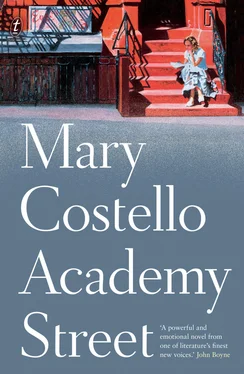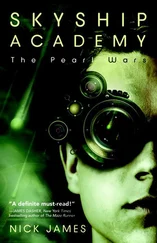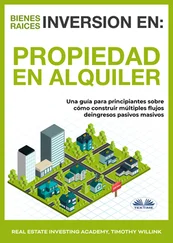Mary Costello - Academy Street
Здесь есть возможность читать онлайн «Mary Costello - Academy Street» весь текст электронной книги совершенно бесплатно (целиком полную версию без сокращений). В некоторых случаях можно слушать аудио, скачать через торрент в формате fb2 и присутствует краткое содержание. Год выпуска: 2014, Издательство: Text Publishing Company, Жанр: Современная проза, на английском языке. Описание произведения, (предисловие) а так же отзывы посетителей доступны на портале библиотеки ЛибКат.
- Название:Academy Street
- Автор:
- Издательство:Text Publishing Company
- Жанр:
- Год:2014
- ISBN:нет данных
- Рейтинг книги:3 / 5. Голосов: 1
-
Избранное:Добавить в избранное
- Отзывы:
-
Ваша оценка:
- 60
- 1
- 2
- 3
- 4
- 5
Academy Street: краткое содержание, описание и аннотация
Предлагаем к чтению аннотацию, описание, краткое содержание или предисловие (зависит от того, что написал сам автор книги «Academy Street»). Если вы не нашли необходимую информацию о книге — напишите в комментариях, мы постараемся отыскать её.
J.M. Coetzee
Academy Street This is an intimate story about unexpected gifts and unbearable losses, and the perpetual ache for belonging. It is exquisitely written and profoundly moving.
Academy Street — читать онлайн бесплатно полную книгу (весь текст) целиком
Ниже представлен текст книги, разбитый по страницам. Система сохранения места последней прочитанной страницы, позволяет с удобством читать онлайн бесплатно книгу «Academy Street», без необходимости каждый раз заново искать на чём Вы остановились. Поставьте закладку, и сможете в любой момент перейти на страницу, на которой закончили чтение.
Интервал:
Закладка:
THE PAIN STRUCK at dawn. Willa came. In the hospital foyer her waters broke. She looked down at her drenched shoes and began to cry.
That evening when it was all over she thought she had scaled Everest, stood at its peak, exhilarated. The next morning the enormity of it all hit her. She had brought forth life, rendered human something from almost nothing, and this power, this ability to create, overwhelmed her.
She did not take to the child. The light down on his skin resembled fur. She could not bear to touch the head, the unknitted bones of his crown. She thought of him as half-hatched, not quite finished. She was not in her right mind. Her body had been riven open, pummelled, her innards displaced. A disgust at her physical self took hold, at the engorged breasts, the bleeding. I am a cow, she thought. But cows are good mothers. On the ward fathers came, brought flowers, cradled infants. She closed her curtain. They brought her the child. Alone, he frightened her, and she rang the bell for them to come and take him away.
On the third day she rose and showered. At feeding time she stood outside the nursery and looked in. He was the only one left. She felt his profound loneliness. Not long born he might drift away again into cold interstellar spaces. She walked to the nurses’ station, her heart pounding. She put down his bottle and stared at the face behind the desk. ‘I want to give my baby up for adoption,’ she said.
All day long she lay thinking, sleeping, crying. She pictured him in other arms, new voices and scents washing over him, colliding inside him. She imagined his confusion, his striving to discern each voice, to retrieve hers in the chaos, until finally, gathering in his cries, he grew mute and surrendered.
She tried to sleep. She dreamt she was back in Easterfield, roaming the dark rooms upstairs. At the end of the hall she found a toddler hunkered down in a corner. He had been there a long time, surviving on nothing. He had something in his hand which he raised to his mouth and bit. She peered closer and saw it was a human finger — hers, her index finger.
When she woke, night had fallen and the ward was in semi-darkness, the other mothers all sleeping. She got out of bed and walked to the nursery. She feared it was too late, like a lamb too long parted from its mother to take. At the sight of him through the glass her arms ached for his weight and she rushed to him. Trembling, she bundled him up in his blanket and fled on weak legs along the corridor, down two flights of stairs. At the front entrance the night guard stepped into her path and, smiling, laid a gentle hand on the bundle. ‘It’s a nice night out there, ma’am, but still, maybe you’d like to get a sweater?’ She looked out at the street. She looked into the man’s eyes, down at the sleeping child, then back at the man’s face. Confused, bewildered, she let him lead her by the arm to the elevator and back up to the ward.
The next morning, with the child asleep beside her, she picked up a pen and wrote: You have a son. His name is Theo.
Nothing was more fully or finely felt, ever again, as the days and nights of that first summer with the child. Her eyes were permanently trained on his and his were locked on hers, a flow of wondrous love streaming between them. Flesh of my flesh, blood of my blood. She took him into her bed at night, wanted to put him back inside her. In the morning she shaded his face from the sun slanting through the blinds. She put soft seamless clothes on him, so that no harshness would touch his skin. She did not ever want to leave the apartment or break the spell. She wanted no interruption, no sight or sound or dissonance from the world to dull his radiance or endanger him.
Little by little, the sense of impending doom that had stalked her for so long began to recede. She wrote to Claire, told her everything. Each day Willa came, sometimes with a child or two in tow, once bringing her husband Darius to build a stand for the crib. Willa took the child from Tess and, with remarkable ease, carried him in the crook of her arm as she cooked and tidied and talked. She introduced Tess to other mothers in the building. One day she brought her own pram onto the landing and together they carried it downstairs and the two women walked their children in the sun. On a park bench, in the shade of trees, Willa told Tess her life story. Born in Mississippi, she never knew her daddy. Her mother moved north to Detroit when Willa and her sister were small. At seventeen she met Darius and knew instantly he was a good man. They married and moved to New York where he got a job driving the A Train. For extra income she minded kids — the Gallaghers on the second floor, the O’Dowds on the fourth — while their mothers went out to work.
In October she left Theo with Willa and returned to work at the hospital. Each evening she rushed home, exhausted, sleep-deprived, and swept him up in her arms, like a woman in love. One evening when she entered her apartment a telegram lay on the floor. Father died peacefully last night. Tell Oliver. Denis. Shaken, she put Theo into the pram and took the subway down to 181st Street, imagining, as the train rushed through the tunnel, that she heard the bawling of newly weaned lambs beyond the walls. She rang Molly’s doorbell and waited, nervous, headstrong, but no longer ashamed. The two women embraced and Fritz lifted out the child. They called Claire. Tess could scarcely make out what Claire was saying. She had Lou Gehrig’s disease. Tess cried into the phone and together they grieved their father.
∼
The child’s hair grew fair, his eyes blue. Early one spring morning when she came off night duty she collected Theo at Willa’s and wheeled him, still sleeping, to the park, and sat on a bench. She loved this hour, with almost no one around, and the hush of the night and the sleeping patients still lingering in her. She grew open and alert to the newness of the morning, the possibilities of the day. She looked at the new green leaves — so many shades of green — and almost had to shield her eyes from their brightness, their newborn beauty. Too much beauty, she thought. And too much happiness, these days. Too much happiness frightened her. She pulled back from these thoughts and looked around. An old man was approaching along the path, as if making for her. She began to gather up her things but then he was there, standing before her. He asked the child’s name. Theo, she replied, warily.
‘Theodore,’ he said. ‘I had a son by that name. We lost him to glandular fever. It was during the Depression. We were living in Tent City.’ He sat next to her and told her the whole story. Theo was sitting up in the pram, his eyes fixed on the old man, and she saw for the first time what he might look like — the boy emerging out of the baby — and the mannerisms he might have, in the years ahead. She had the sudden urge to confide in this stranger, befriend him, make him a surrogate grandfather. A gift for him, too.
The old man looked at Tess with rheumy eyes. ‘He was our only child. My wife died twenty-three years ago.’ She saw his clean-shaven face, his neat clothes. She got a glimpse of his life, his daily routine, the order and discipline, rising and cooking and walking. He turned his gaze back to the child and she felt him wander. She wanted to say something, call him back from his sorrow.
‘This is my love child,’ she said.
He nodded abstractly and his eyes drifted off along the path in the wake of other strollers. Then he got up, walked over to the stone tables where old men played chess on summer evenings. She watched him sit, alone, and stare at the chequered table top.
That night in her kitchen, she said it again, love child . Born against the odds, more hard-won, more precious, than all others. She had not elected to be a mother. In the next room the child whimpered. She listened, waited for him to return to sleep. She would have liked to have the father there beside her, for him to hear that whimper too. The memory of his face returned. The memory of his beauty hurt her mind. On the radio Billie Holiday began to sing. More than you know. She thought of the city beyond the apartment, lights twinkling in high-rise buildings all around her. Inside, nests of families. He could not give what he had not got. She began to weep. She knew that a great part of love was mercy. What she wished for then, what she wanted more than anything else, was for all ultimate good to come to him.
Читать дальшеИнтервал:
Закладка:
Похожие книги на «Academy Street»
Представляем Вашему вниманию похожие книги на «Academy Street» списком для выбора. Мы отобрали схожую по названию и смыслу литературу в надежде предоставить читателям больше вариантов отыскать новые, интересные, ещё непрочитанные произведения.
Обсуждение, отзывы о книге «Academy Street» и просто собственные мнения читателей. Оставьте ваши комментарии, напишите, что Вы думаете о произведении, его смысле или главных героях. Укажите что конкретно понравилось, а что нет, и почему Вы так считаете.












